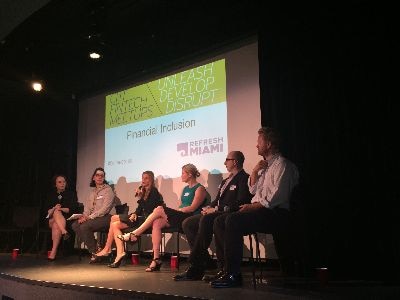Citi FinTech Meetup Miami: How Financial Technology Can Drive Financial Inclusion
Technology can play a vital role in bringing more people into the financial mainstream. While most may think that's a greater demand in the developing world, some of America's largest cities struggle with the financial isolation of huge groups of their populations.
We see one of the starkest domestic examples in Miami.
Despite Miami's high rises and beautiful beaches, its households are extremely financially vulnerable. According to FamilyAssetsCount.org, nearly seven out of every ten households in Miami lack sufficient savings to sustain three months at the poverty level in the event of a shock to income, like a medical bill or the loss of a job. That number of "liquid asset poor" households climbs to 79% for African-American and 74% for Hispanic households.
Yet, this does not define Miami, a burgeoning technology hub with a strong geographic and cultural connection to Latin America that is taking a growing interest in financial inclusion. At the recent second installment of the Citi FinTech MeetUps -- Citi's initiative to engage with thriving local tech and developer ecosystems – host RefreshMiami gathered financial inclusion experts and practitioners from the financial industry, the local non-profit sector, and both new and more mature startups for a discussion of the unique opportunity facing the city.
Some of the key takeaways from the evening included:
The challenges are more complex than we think. With more than 28% of residents without a bank account, Miami is the most "unbanked" large city in the United States – that's three times the national average. Of those Miamians who do have a bank account, 27% still rely on alternative financial services like check cashers and payday lenders, whose predatory fees trap vulnerable customers into a deepening cycle of debt.
These numbers illustrate challenges, not unique to Miami, which in many cases highlight a "service gap" for underserved communities which technology may be able to fill.
When it comes to addressing the needs of the underserved, technology alone is not enough.
Much of the conversation focused on the importance of understanding people's complex needs, behaviors and daily rituals to successfully leveraging technology to expand financial inclusion. Panelists discussed the need for continuous feedback and learning, for staying informed about what kinds of services communities use and what they need -- either through data analysis or human-centered design tools such as ethnographic research – so that technology can be successfully used to develop new services or take existing ones to scale that are not only inclusive, but which are viable and sustainable from a business perspective as well.
Gretchen Beesing of Catalyst Miami, which launched an initiative with Citi Community Development last year that enables their financial coaches to open bank accounts for their previously-unbanked clients from anywhere using just a laptop and a web browser, put it this way: "The most successful innovation in the financial inclusion space happens when we're able to identify a trend already underway at the grassroots level, and amplify or accelerate it through technology."
Miami has tremendous potential as a hub of inclusive fintech development for Latin America. Miami is home to one of the biggest immigrant populations in the country, the majority of its foreign-born residents representing countries across Latin America. This rich cultural and geographic context positions Miami's startup community to serve as a launch pad for the development of inclusive fintech solutions that meet the growing needs of consumers, businesses and governments throughout Latin America – solutions that can be scaled and replicated, and integrated with existing systems in new and innovative ways. Solutions which expand access to the financial mainstream for those underserved communities which are becoming increasingly connected through mobile and internet touchpoints – whether that is their intended impact or not.
Citi is committed to facilitating the growth and success of fintech communities around the world by supporting initiatives like this one and the Citi Mobile Challenge, which provide a staging ground for introducing new players and exciting new ideas. It is only through ongoing collaboration that truly innovative ideas can emerge that both deliver value as a business and take on some of society's most complex challenges.
